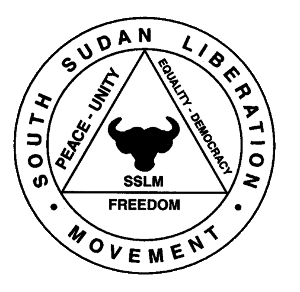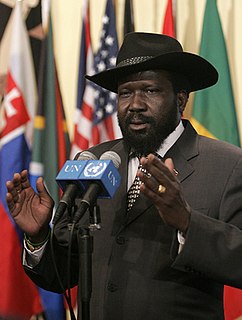
The South Sudan Liberation Movement (SSLM) is an armed group that operates in the Upper Nile Region of South Sudan. The group's creation was announced in November 1999 by people of the Nuer ethnicity who were in both the rebel Sudan People's Liberation Army (SPLA) and the government-allied South Sudan Defence Forces (SSDF) gathered in Waat. The SSLM was declared to be unaligned in the Second Sudanese Civil War, then entering its sixteenth year. The name "South Sudan Liberation Movement" was decided upon the next year, borrowing from the earlier Southern Sudan Liberation Movement, which existed in the 1980s.

Salva Kiir Mayardit is a South Sudanese politician who has been President of South Sudan since its independence in 2011. He is a Dinka and prior to independence, he was President of the Government of Southern Sudan, as well as First Vice President of Sudan, from 2005 to 2011.

The politics of South Sudan concern the system of government in the Republic of South Sudan, a country in East Africa, and the people, organisations, and events involved in it.
Peter Gatdet Yak or Peter Gadet was a former Sudan People's Liberation Army (SPLA) general who was the leader of the South Sudan Liberation Army (SSLA), a rebel movement in South Sudan. He was born between 1957 and 1959 in Mayom County, South Sudan.

South Sudan, officially known as the Republic of South Sudan, is a landlocked country in East-Central Africa. It gained independence from the Republic of the Sudan in 2011, making it the most recent sovereign state with widespread recognition. Its capital and largest city is Juba.
The history of South Sudan comprises the history of the territory of present-day South Sudan and the peoples inhabiting the region.
Paulino Matip Nhial, or Matiep Nhial, was a military leader and politician in South Sudan.
Ethnic violence in South Sudan has a long history among South Sudan's varied ethnic groups. South Sudan has 64 tribes with the largest being the Dinkas, who constitute about 35% of the population and predominate in government. The second largest are the Nuers. Conflict is often aggravated among nomadic groups over the issue of cattle and grazing land and is part of the wider Sudanese nomadic conflicts.

The United Nations Mission in South Sudan (UNMISS) is the newest United Nations peacekeeping mission for the recently independent South Sudan, which became independent on 9 July 2011. UNMISS was established on 8 July 2011 by United Nations Security Council Resolution 1996 (2011). UNMISS is since December 2016 headed by Special Representative of the Secretary-General David Shearer who succeeded Ellen Margrethe Løj. As of May 2019, it is composed of 15,000 military personnel, 1,800 police, and 2,800 civilian workers.It is headquartered in the South Sudanese capital of Juba.

The South Sudanese Civil War is an ongoing conflict in South Sudan between forces of the government and opposition forces. In December 2013, President Kiir accused his former deputy Riek Machar and ten others of attempting a coup d'état. Machar denied trying to start a coup and fled to lead the SPLM – in opposition (SPLM-IO). Fighting broke out between the Sudan People's Liberation Movement (SPLM) and SPLM-IO, igniting the civil war. Ugandan troops were deployed to fight alongside the South Sudanese government. The United Nations has peacekeepers in the country as part of the United Nations Mission in South Sudan (UNMISS). In January 2014 the first ceasefire agreement was reached. Fighting continued and would be followed by several more ceasefire agreements. Negotiations were mediated by "IGAD +". A peace agreement known as the "Compromise Peace Agreement" was signed in August 2015. Machar returned to Juba in 2016 and was appointed vice president. Following a second breakout of fighting within Juba, the SPLM-IO fled to the surrounding and previously peaceful Equatoria region. Kiir replaced Machar as First Vice President with Taban Deng Gai, splitting the opposition, and rebel in-fighting has become of major part of the conflict. Rivalry among Dinka factions led by the President and Paul Malong Awan have also led to fighting. In August 2018, another power sharing agreement came into effect.
The following are international reactions to the South Sudanese Civil War:

The Sudan People's Liberation Movement-in-Opposition, also known as the anti-governmental forces (AGF), is a mainly South Sudanese political party and rebel group that split from the Sudan People's Liberation Movement in 2013, due to political tensions between President Salva Kiir and Vice President Riek Machar over leadership of the SPLM. Tensions grew between forces loyal to Kiir and Machar and South Sudan plunged into the South Sudanese Civil War.
The following lists events that happened during 2011 in Sudan.
The following lists events that happened during 2006 in Sudan.

Heavy armed clashes have been ongoing in Wau State since late June 2016, between the Dinka-dominated Sudan People's Liberation Army (SPLA) and local opposition forces, consisting of tribal Fertit militias as well as fighters claiming allegiance to Riek Machar. It is unclear to what extent these rebels are actually part of the SPLM-IO or acting independently while using the SPLM-IO's name. So far, the clashes resulted in the arrest of the state's governor, Elias Waya Nyipuoc, widespread death and destruction in the state capital, Wau town, and the displacement of up to 150,000 people.
Events in the year 2016 in South Sudan.
Mathiang Anyoor, also spelled Mathiang Anyur, also known as Dot Ke Beny, is a Dinka-affiliated militia group in South Sudan. Originally an ad-hoc volunteer force founded in 2012, the militia was transformed into a private army to protect President Salva Kiir Mayardit and army chief Paul Malong Awan. However, the South Sudanese military (SPLA) claims that it is just another battalion. Much of the ethnic violence against non-Dinkas in the South Sudanese Civil War is attributed to the militia.
The peace processes were held in Addis Ababa, Ethiopia. The sittings were aimed to bring South Sudan’s rival factions, SPLM under the leadership of Salva Kiir and SPLM-IO- an Opposition party under the leadership of Riek Machar Teny, to have a common ground for the cessation of hostilities that have prevailed since the beginning in December 2013. The peace process under IGAD supervision has had parallel efforts to bring South Sudan factions to terms.









